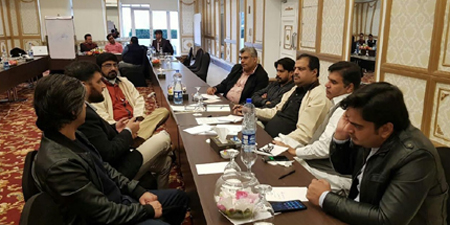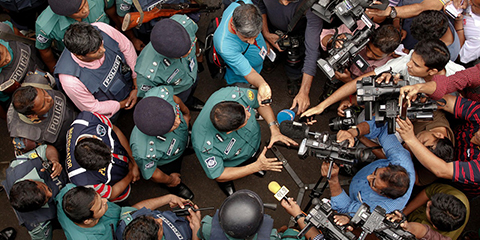Journalists attend workshop on Sustainable Agriculture in Bhurban
JournalismPakistan.com | Published 6 years ago
Join our WhatsApp channel
BHURBAN — Speakers at a two-day workshop on ‘Sustainable Agriculture’ stressed the need for adoption of innovative and latest agricultural technology coupled with the implementation of Good Agricultural Practices to tackle the issue of reducing available farmland per person per hectare and feed the increasing mouths.
As compared to 1950, the global population will be 300 percent in 2020, while arable land in this period will increase only by 15 percent thus bringing down the farmland availability by 60 percent per person per hectare.
The workshop was organized by the CropLife Pakistan Association in collaboration with the Agriculture Journalists Association (AJA) to highlight the importance of sustainable agriculture in the face of numerous challenges to national food security.
More than 25 journalists covering the agriculture sector from leading English and Urdu media outlets attended the two-day workshop.
In his introductory presentation, Dr. Muhammad Afzal, Executive Director CropLife Pakistan, explained that growing population, climate change, scarcity of water and changing lifestyles continue to pose challenges to the national food security, emphasizing the need to promote sustainable means to grow food and embrace technological innovations that enable the same.
“This workshop for media professionals is part of CropLife Pakistan’s broader effort to create awareness and understanding of agriculture technologies. We hope this interaction provides the participants a fresh perspective and adds to their knowledge”, he added.
Subsequent speakers also highlighted the importance of an enabling business environment that encourages investments in innovative technologies, with specific focus on enhancing crop productivity while reducing impact on the environment.
Sustainable agricultural practices involve the judicious use of water resources, minimizing soil erosion, reducing fuel consumption and optimizing land utilization.
While providing an overview of sustainable agriculture technologies, Dr. Muhammad Afzal explained at length the benefits of biotechnology in relation to promoting sustainable agriculture.
“Biotechnology allows farmers to produce more using fewer resources; it has the potential to reshape productivity in Pakistan by addressing both climate change and food security challenges,” he further reiterated.
Dr. Afzal also pointed out that the Government of Pakistan has had a clear policy on biotechnology for the past three decades and has invested heavily in research and development of this technology, emphasizing that regulatory decisions must be consistent with this policy to build confidence of the plant science industry.
“Pakistan has 45 biotech institutions, over 500 Ph.D. scientists, and numerous ongoing projects across various food and non-food crops. Biotechnology also features prominently as a priority area in all Government policy documents, including the Vision 2025 and the National Food Security Policy 2018.,” explained Dr. Afzal.
He further added that “It is imperative that policymakers provide a stable regulatory and legal framework to facilitate investment and technology transfer and ensure that regulatory decisions are guided by the overarching policy framework and scientific evidence.”
By combining sustainable agricultural practices with innovative agrarian technologies, Pakistan, with its ever-increasing population, can combat the adverse effects of climate change and ensure food security for generations to come.

























